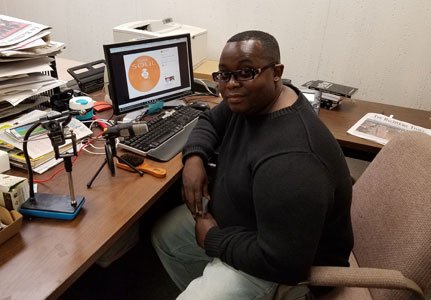BALTIMORE — The statistics are eye opening! Of the 1.5 million heart attacks and strokes that befall Americans each year, about 44 percent of the victims are African-American males and 48 percent are black women, according to the Centers for Disease Control and Prevention.
May ushers in National Stroke Awareness Month, particularly meaningful for the Baltimore Times and its longtime Indie Soul Columnist Phinesse Demps. At 49, Demps continues to recover from a massive stroke that he says caught him totally off guard and nearly killed him.
The stroke occurred on July 15, 2015 as he was wrapping up his regular radio appearance on the Sean Yoes Radio Show on WEAA.
“I was on the phone in my apartment doing the show from there with Sean and I remember him saying that I didn’t sound right, that my speech was kind of slurred,” Demps said.
The 49-year-old also felt something happening.
“I remembered a commercial from when I was younger that advised people to take an aspirin if they think they were experiencing a heart attack, so I reached for an aspirin thinking that it could be a heart attack,” he said.
Eerily, he recalled— almost in slow motion— seeing himself, fall toward his bathroom floor and hitting his head. Demps lay helpless for a full day on the floor of his Baltimore apartment.
When he didn’t show up for work the next day, Times employee Ida Neal sent two friends to check on Demps and when they didn’t get an answer Neal returned to the apartment, contacted the landlord and convinced him to open Demps’ apartment, he said.
“The landlord saw me on the floor and he said he needed me to sit up but I couldn’t move and he called an ambulance,” Demps said.
Demps was placed in intensive care where he languished for 19 days and with doctors giving him little chance for survival.
Now, about 10 months later, Demps is regularly rehabbing and has finally returned to work. He has graduated from a wheelchair to walking with a cane.
Most importantly, Demps says he has finally realized that he was as much to blame for his condition. It wasn’t all time and unforeseen occurrences that simply befell him. It was ignorance.
“I always did everything the right way. I exercised regularly, walked everywhere I went and I ate properly, no meat, I’m a vegetarian. I was in the gym four times a week early in the morning,” he said. “I had no previous health problems except a migraine that I’d take an Advil for and close the shades and sleep and it would be better.”
Where he failed?
“I wasn’t going to a doctor on a regular basis and, in my family, we have a history of high-blood pressure,” he said. “So, you find yourself thinking that it won’t happen to you but there’s also hypertension in the family and that’s a silent killer, it elevated the blood pressure which caused the vessel in my brain to pop.”
The importance of knowing one’s family history, having regular visits to a primary care physician, checking blood pressure, eating properly and exercise should be on everyone’s every day to do list, according to Demps.
“When the doctors see me now they tell me that I’m not even supposed to be here— be alive,” he said.
The illness has given Demps a new perspective, even about the recent death of music icon Prince and the Black Lives Matter Movement.
“As black men you have to go to the doctor. Obviously we don’t yet know what killed Prince, but at 57 you can’t do what you do at 27,” Demps said. “And, when you talk about Black Lives Matter, I don’t want to hear that anymore unless you add in the health component because we, as black men, our health has to matter. We have to go to a doctor and many of us don’t.”
Recent studies have found that one-third of strokes occur in people under the age of 65.
“I have my good days and my bad days,” Demps said. “I have short term memory problems, but my long term memory is good.”
With 4,000 Facebook friends, Demps received 3,000 notes and read each one.
“It was like reading my own eulogy,” he said. “It’s wrong for me to put my family and my friends through this. We, as black men, have to do a better job taking care of ourselves.”
